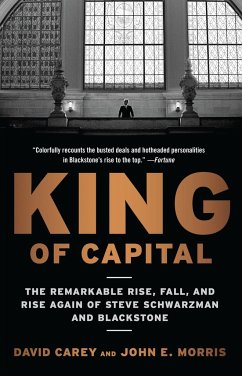The story of Steve Schwarzman, Blackstone, and a financial revolution, King of Capital is the greatest untold success story on Wall Street.
In King of Capital, David Carey and John Morris show how Blackstone (and other private equity firms) transformed themselves from gamblers, hostile-takeover artists, and barbarians at the gate into disciplined, risk-conscious investors while the financial establishment banks and investment bankers such as Citigroup, Bear Stearns, Lehman, UBS, Goldman Sachs, Merrill Lynch, Morgan Stanley were recklessly assuming risks, leveraging up to astronomical levels and driving the economy to the brink of disaster. Now, not only have Blackstone and a small coterie of competitors wrested control of corporations around the globe, but they have emerged as a major force on Wall Street, challenging the likes of Goldman Sachs and Morgan Stanley for dominance.
Insightful and hard-hitting, filled with never-before-revealed details about the workings of a heretofore secretive company that was the personal fiefdom of Schwarzman and Peter Peterson, King of Capital shows how Blackstone and private equity will drive the economy and provide a model for how financing will work in the years to come.
In King of Capital, David Carey and John Morris show how Blackstone (and other private equity firms) transformed themselves from gamblers, hostile-takeover artists, and barbarians at the gate into disciplined, risk-conscious investors while the financial establishment banks and investment bankers such as Citigroup, Bear Stearns, Lehman, UBS, Goldman Sachs, Merrill Lynch, Morgan Stanley were recklessly assuming risks, leveraging up to astronomical levels and driving the economy to the brink of disaster. Now, not only have Blackstone and a small coterie of competitors wrested control of corporations around the globe, but they have emerged as a major force on Wall Street, challenging the likes of Goldman Sachs and Morgan Stanley for dominance.
Insightful and hard-hitting, filled with never-before-revealed details about the workings of a heretofore secretive company that was the personal fiefdom of Schwarzman and Peter Peterson, King of Capital shows how Blackstone and private equity will drive the economy and provide a model for how financing will work in the years to come.
The authors [take] us from the early days of the Blackstone Group, when the firm was just two guys and a secretary, to the buyout boom, when Mr. Schwarzman s conspicuous consumption became a symbol of the new Gilded Age. In between, the book dives deeply into the firm s signature deals Celanese! Nalco! Distressed cable bonds! that made Mr. Schwarzman and his partners so rich. It also delivers some fun details about many of the now-famous Wall Street players that did tours of duty at the firm.
New York Times DealBook
Carey and Morris thorough reporting offers a compelling look into the little understood Wall Street giant and the secrets of its success.
Worth Magazine
[R]anks as one of the most even-handed treatments of the industry. David Carey and John Morris . . . received unusual access to Blackstone. . . . This allowed them to chronicle the firm in full and entertaining fashion across its 25-year history.
Bloomberg Brief Mergers
[A] broad history of private equity, with Blackstone as the touchstone.
Fortune.com
Check out "King of Capital" because it's got gossip, it's got brains, and it's as readable as hell. And it's got some really good Schwarzman stories too.
The Deal
"King of Capital aspires to be a serious portrait of Blackstone and the way that Schwarzman so brilliantly built it up, scoring numerous coups along the way and avoiding the mistakes of many competitors. And it does a fine job in what it sets out to do."
Financial Times
The authors link Blackstone s history to the larger story of private equity s expansion and its relationship to corporate America. They offer a lucid explanation of how the debt markets evolved from junk bonds to securitised loans, changing the types of deals that private-equity firms were able to finance.
The Economist
New York Times DealBook
Carey and Morris thorough reporting offers a compelling look into the little understood Wall Street giant and the secrets of its success.
Worth Magazine
[R]anks as one of the most even-handed treatments of the industry. David Carey and John Morris . . . received unusual access to Blackstone. . . . This allowed them to chronicle the firm in full and entertaining fashion across its 25-year history.
Bloomberg Brief Mergers
[A] broad history of private equity, with Blackstone as the touchstone.
Fortune.com
Check out "King of Capital" because it's got gossip, it's got brains, and it's as readable as hell. And it's got some really good Schwarzman stories too.
The Deal
"King of Capital aspires to be a serious portrait of Blackstone and the way that Schwarzman so brilliantly built it up, scoring numerous coups along the way and avoiding the mistakes of many competitors. And it does a fine job in what it sets out to do."
Financial Times
The authors link Blackstone s history to the larger story of private equity s expansion and its relationship to corporate America. They offer a lucid explanation of how the debt markets evolved from junk bonds to securitised loans, changing the types of deals that private-equity firms were able to finance.
The Economist








